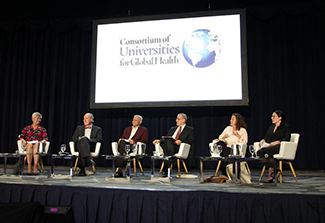Reimagining global health in the 21st century
May/June 2023 | Volume 22 Number 3
 Photo credit: Fogarty International CenterOver a decade ago, the CUGH executive board set out to find a consensus definition of global health. Moderators and panelists at a CUGH 2023 plenary session (pictured) aimed to define it in today's context.
Photo credit: Fogarty International CenterOver a decade ago, the CUGH executive board set out to find a consensus definition of global health. Moderators and panelists at a CUGH 2023 plenary session (pictured) aimed to define it in today's context.
By Judy Coan-Stevens
Over a decade ago, the Consortium of Universities for Global Health (CUGH) executive board set out to find a consensus definition of global health. Their 2009
Lancet paper,
Towards a common definition of global health, set some parameters around what it meant. Fourteen years later, at the 2023 CUGH conference, Dr. Judith Wasserheit, Fogarty advisory board member and one of the
Lancet paper authors, noted “tectonic shifts" since then, not least of which is the COVID-19 pandemic. In her introduction to the plenary session, “Reimagining global health in the 21st century,” Wasserheit noted, “While there have been advances and improvements, many communities have been left behind, and discussions about equity and decolonization have gained much more traction in recent years."
The session was co-moderated by Wasserheit, fellow Fogarty board member Dr. Maureen Lichtveld, and Acting Fogarty Director Dr. Peter Kilmarx. The panelists were Dr. Ala Alwan, former director of WHO Eastern Mediterranean Region and former Iraqi Minister of Health; Dr. Tahmeed Ahmed, executive director of icddr,b, Bangladesh; Dr. Patricia García, former dean of Universidad Peruana Cayetano Heredia and former Minister of Health, Peru; and Dr. Melissa Salm, postdoctoral fellow at the Center for International Security & Cooperation, Stanford University.
The panelists offered their thoughts on how the definition has changed over the last two decades. Salm commented that, “Health is so much more than the absence of disease." She asked the audience to consider a One Health approach that, “decenters the human in global health as animal, environmental, and human health are all factors to be considered."
When panelists were asked what keeps them up at night and what two aspects of global health are still working, Ahmed answered, “If we cannot combat inequity, we cannot do global health." Alwan commented that the global health community must keep and reinforce effective cooperation with low- and middle-income countries (LMICs). Salm added that the global health community needs to ask, “who decides what is a global health priority and which solutions to pursue."
Garcia echoed Salm's sentiment by stating that she's worried by the “asymmetry of power and funding" in global health, and while this may be improving, the community is “still not allowing local actors to be empowered." Garcia also believes there isn't enough focus on prevention and intervention in global health practice, noting that the focus is often only on biomedical solutions. Alwan added that the increasing engagement of non-state actors like GAVI and the Global Fund is another sign of change. “Today we see more global health partners operating than 20 years ago," said Alwan. “But the downside is there are no clear goals when there is competition, a lack of coordination, and repetition."
The panelists had diverging definitions when asked what makes something a global health issue. Ahmed and Alwan agreed that the burden should be substantial and transcend boundaries, while García believes global health means sharing cooperative ways of solving problems across countries. Salm added, “Global health is a model that interconnects global entities to respond to emergencies." The panelists also discussed the potential of artificial intelligence and machine learning to solve global health problems, but emphasized the need for these technologies to be designed by and for local communities.
Regarding what changes are needed in the field, Ahmed offered that institutions should move from theoretical to practical, field-based work, and Alwan stressed, “I would like to see more implementation science research taking place within ministries of health." García suggested standing up more regional health agencies, like Africa CDC, to shift global health practice out of high-income countries.
Lichtveld closed the discussion by saying, “We must engage, collaborate, and invest, address asymmetries of power, and ask ourselves if global health is just an organizational model and if emergency preparedness, implementation science, and One Health are essential to global health. We must remember that global health is linked to government and governance, and finally, we must address who will be responsible for global health in the future."
The discussion is continuing, and panel members plan to write a paper or series of papers on the topic in the coming months.
More Information
Updated June 14, 2023
To view Adobe PDF files,
download current, free accessible plug-ins from Adobe's website.